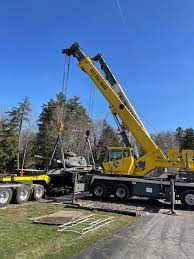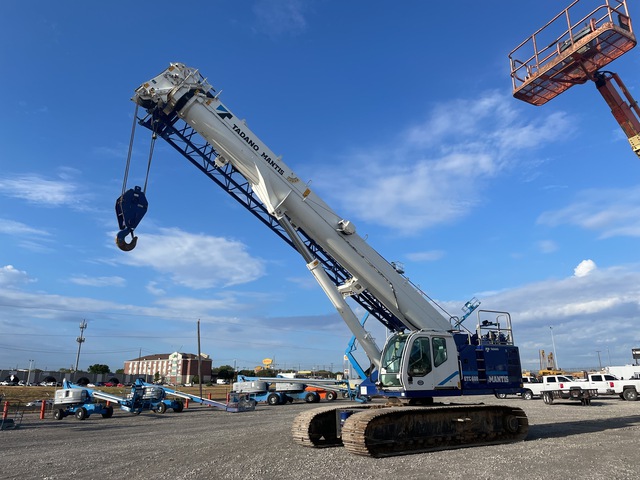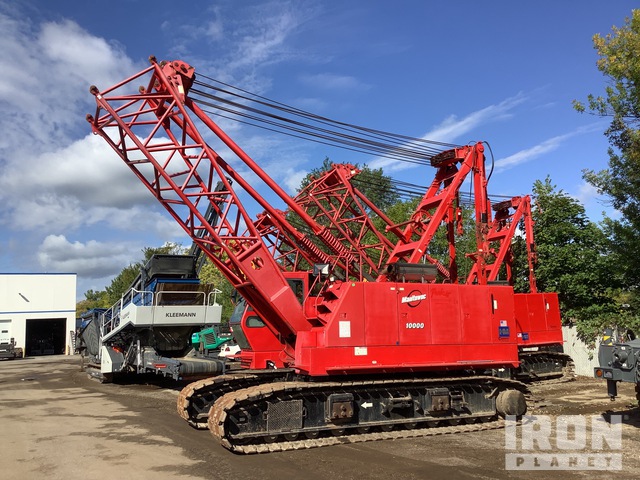When it comes to optimizing efficiency in construction projects, one solution stands tall – crane rental services.
In the hustle and bustle of the construction industry, having the right crane at the right time can make all the difference. From towering skyscrapers to residential renovations, cranes play a pivotal role in lifting operations to new heights.
In this comprehensive guide, we delve into the world of crane rental services, uncovering the key benefits, types of cranes available, and essential considerations for selecting the ideal crane for your project. Whether you’re a seasoned contractor or a novice developer, the insights shared here will empower you to make informed decisions that streamline your operations and boost productivity.
Get ready to elevate your construction game as we unlock the full potential of crane rental.
Advantages of Renting Cranes
Renting cranes offers a multitude of advantages that can significantly enhance the efficiency and productivity of construction projects. One of the primary benefits is cost-effectiveness. Purchasing a crane outright can be a substantial financial burden, especially for small to medium-sized companies. By opting for crane rental services, companies can allocate their resources more strategically, investing in other critical areas of their projects. This flexibility allows businesses to maintain an optimal cash flow while still having access to high-quality equipment when needed.
Another key advantage is the access to a diverse fleet of cranes. Rental companies typically offer a wide range of crane types and models to suit various project requirements. Whether you need a towering tower crane for a high-rise building, a mobile crane for flexible maneuverability, or a compact crane for tight urban spaces, rental services can provide the right equipment without the hassle of ownership. This variety ensures that contractors can select the most suitable crane for their specific tasks, enhancing overall project efficiency.
Additionally, renting cranes allows for greater adaptability. Construction projects can often experience unforeseen changes, whether due to budget constraints, project scope alterations, or unexpected site conditions. Renting cranes provides the flexibility to scale up or down as required, allowing contractors to adjust their equipment needs without the long-term commitment of purchasing. This adaptability is crucial in the fast-paced construction environment where timelines and project requirements can shift unexpectedly.

Types of Cranes Available for Rent
When it comes to crane rental services, understanding the types of cranes available is essential for making the right choice for your project. Each type of crane serves different purposes and comes with unique advantages. One of the most common types is the mobile crane, known for its versatility and ability to navigate different terrains. These cranes are equipped with wheels or tracks, making them suitable for various job sites, from urban areas to remote locations. Their capacity to lift heavy loads while being mobile makes them a popular choice for many contractors.
Tower cranes represent another significant category in crane rentals. These towering giants are often seen at construction sites for high-rise buildings. Tower cranes offer exceptional lifting capabilities and can reach impressive heights while maintaining stability. Their fixed position allows them to lift heavy materials vertically and horizontally, making them indispensable for large-scale construction projects. However, they require careful planning and setup, which is why experienced rental companies often manage the logistics involved.
Additionally, there are specialized cranes like crawler cranes and articulating cranes. Crawler cranes are equipped with tracks that allow them to traverse rough terrain, making them ideal for construction sites with uneven ground. Articulating cranes, on the other hand, have a unique jointed boom that provides enhanced maneuverability, allowing them to access tight spaces. Understanding the specific needs of your project will help you determine which type of crane is best suited for your operations, ensuring a successful outcome.
Factors to Consider When Choosing a Crane Rental Service
Selecting the right crane rental service is pivotal to the success of your construction project. One of the primary factors to consider is the reputation of the rental company. Researching customer reviews, testimonials, and industry reputation can provide valuable insights into the reliability and quality of service offered. A reputable crane rental company will have a proven track record of providing well-maintained equipment and excellent customer support, which can significantly impact your project’s efficiency.
Another critical consideration is the availability of the specific crane type you need. Different projects require different crane capabilities, and not all rental companies have the same inventory. It’s essential to communicate your project requirements clearly to the rental service and ensure they can provide the right equipment for the job. Additionally, consider the rental company’s ability to deliver and set up the crane on-site. Timely delivery and professional setup can save you valuable time and minimize potential delays.
Lastly, reviewing the rental terms and conditions is crucial. Understanding the rental agreement, including pricing, insurance coverage, and liability issues, can prevent misunderstandings down the line. Look for hidden fees or clauses that may affect your budget. Transparency in the rental process is vital, so ensure that all terms are clearly communicated and understood before finalizing the agreement. Taking these factors into account will help you choose a crane rental service that aligns with your project goals and operational needs.
Safety Regulations and Guidelines for Crane Operation
Safety is paramount in the construction industry, particularly when operating heavy machinery like cranes. Familiarizing yourself with the safety regulations and guidelines is essential to protect workers and ensure compliance with local laws. The Occupational Safety and Health Administration (OSHA) provides comprehensive guidelines on crane operation, including requirements for operator qualifications, equipment inspections, and safe lifting practices. Adhering to these regulations is crucial for minimizing risks and maintaining a safe work environment.
One of the key safety measures involves ensuring that all crane operators are properly trained and certified. Operators must possess the necessary skills to handle the equipment safely and efficiently. This training often includes understanding the crane’s specifications, load capacities, and the proper use of rigging techniques. Additionally, regular safety meetings and ongoing training for all personnel involved in crane operations can help reinforce safe practices and raise awareness of potential hazards.
Another critical aspect of crane safety is conducting thorough inspections before each use. Rental companies typically perform routine maintenance and inspections on their cranes, but it’s essential for operators to conduct their own pre-operation checks. This includes examining the crane’s mechanical systems, rigging equipment, and emergency safety devices. By prioritizing safety and adhering to established guidelines, construction teams can significantly reduce the risk of accidents and create an environment where productivity can thrive.

Understanding Crane Rental Contracts
A clear understanding of crane rental contracts is vital for a successful rental experience. These agreements outline the terms of the rental, including the duration, costs, and responsibilities of both parties. One of the first things to review in a rental contract is the rental period. Most contracts specify a minimum rental duration, so it’s essential to estimate your project’s timeline accurately to avoid incurring additional charges for extended usage.
Costs associated with crane rentals can vary significantly based on several factors, including the type of crane, rental duration, and any additional services required, such as transportation and setup. It’s important to clarify what is included in the rental price and to be aware of any potential hidden fees. Some contracts may also include clauses related to fuel usage, maintenance, and damage liability, all of which should be thoroughly understood before signing.
Additionally, terms related to insurance and liability are crucial components of crane rental contracts. Rental companies often require lessees to carry liability insurance to cover any damages or accidents that may occur during the rental period. Understanding your responsibilities in terms of insurance coverage can protect you from unexpected financial burdens. By carefully reviewing and comprehending the rental contract, you can ensure a smooth and hassle-free rental experience, allowing you to focus on your project rather than contractual disputes.
Cost Analysis of Crane Rental Services
Conducting a thorough cost analysis of crane rental services is essential for effective project budgeting. The overall cost of renting a crane can vary based on several factors, including the type of crane, rental duration, and additional services provided by the rental company. Mobile cranes, for instance, may have different rental rates compared to tower cranes due to their versatility and range of capabilities. Understanding these differences can help contractors make informed decisions based on their project needs.
In addition to the base rental fee, contractors should factor in additional costs such as transportation, setup, and insurance. Some rental companies charge extra for transporting the crane to the job site, while others may include it in the overall rental price. Similarly, setup fees can vary, especially for more complex crane models that require specialized equipment or additional personnel for assembly. By anticipating these costs, contractors can better prepare their budgets and avoid unexpected financial surprises.
Lastly, considering the potential for downtime or delays is crucial in a cost analysis. If a crane is not available when needed, the project timeline could extend, resulting in additional labor costs and lost productivity. Evaluating the reliability of the rental company and their ability to provide timely service can ultimately impact the overall cost-effectiveness of renting a crane. By conducting a comprehensive cost analysis, contractors can ensure they make strategic financial decisions that support their project’s success.
Benefits of Professional Crane Operators
Hiring professional crane operators offers numerous benefits that can enhance the safety and efficiency of construction operations. One of the primary advantages is the expertise and experience that professional operators bring to the job site. These individuals are trained to handle cranes of various types and sizes, ensuring that they can operate the machinery safely and effectively. Their knowledge of load dynamics, rigging techniques, and safety protocols significantly reduces the risk of accidents and improves overall site safety.
Moreover, professional crane operators can optimize crane performance and productivity. Their familiarity with the equipment allows them to execute lifts efficiently, minimizing downtime and ensuring that materials are moved swiftly throughout the construction site. This efficiency can lead to significant time savings, allowing projects to stay on schedule and within budget. By employing skilled operators, contractors can enhance their overall project productivity and reduce the likelihood of costly delays.
Additionally, professional operators can contribute to better communication and collaboration on the job site. They often work closely with other construction personnel, including riggers and site supervisors, to coordinate lifts and ensure that everyone is on the same page. This collaborative approach fosters a safer and more organized work environment, where tasks are completed in a timely manner. Ultimately, hiring professional crane operators provides construction teams with the expertise and efficiency needed to drive project success.
Conclusion and Key Takeaways
As we have explored throughout this guide, crane rental services are a vital component of successful construction projects. The advantages of renting cranes, from cost savings to access to a diverse fleet, make it an appealing option for contractors looking to optimize efficiency. Understanding the various types of cranes available and the factors to consider when choosing a rental service can significantly enhance project outcomes.
Moreover, prioritizing safety regulations and effective communication around crane operation is crucial to maintaining a secure work environment. A clear comprehension of rental contracts and costs can prevent misunderstandings and ensure that projects remain within budget. Lastly, the value of hiring professional crane operators cannot be overstated, as their expertise contributes to overall site safety and productivity.
By leveraging crane rental services thoughtfully and strategically, contractors can unlock new levels of efficiency in their construction operations, allowing them to meet deadlines and exceed client expectations. As the industry continues to evolve, staying informed about best practices in crane rental will empower professionals to navigate challenges and seize opportunities in their projects.
For further information on crane rental or to discuss our services, call Priority Crane Rentals at (877) 856-9686.

